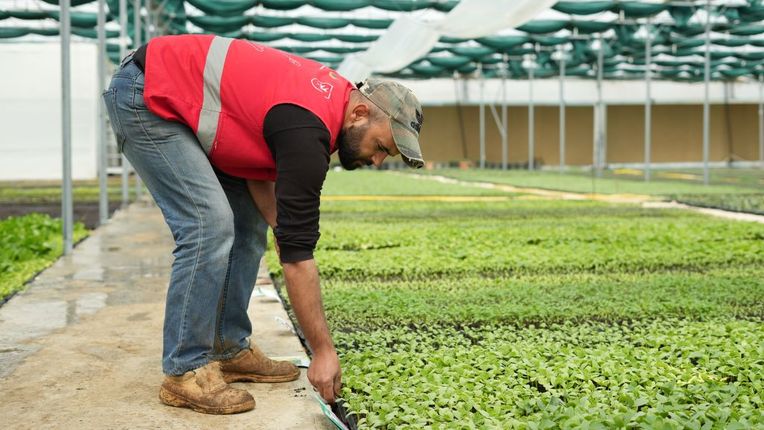
Strengthening resilience of the vulnerable population in rural regions of Lebanon by promoting agricultural production
More than 3 million people are currently affected by food insecurity in Lebanon. While the majority of products is imported from overseas, local farmers, particularly small farmers and home-based agricultural businesses, face various challenges to sustain their livelihoods. Oftentimes they lack access to technologies such as drip irrigation, hampering food production, or cannot afford climate-resilient crop varieties. A large proportion of farmers even rely on addtitional activities for sufficient income, and the market shocks triggered by the crisis in Lebanon have further damaged smallholder farmers, limiting access to nutritious food and leading to malnutrition in the country.
To address these challenges, Malteser International together with its partner the Order of Malta Lebanon aim to support local food production and processing, as well as empowering particularly women-owned agribusinesses, train youth in the agricultural sector and strengthen the extension capacities of the Agro-Humanitarian-Centers by the Order of Malta Lebanon. Our goal is to enhance sectoral stability, climate-smart agriculture, and transformative infrastructure to boost resilience in Lebanon.
Driving factors behind the severe food insecurity in Lebanon are high inflation, currency depreciation, halted state subsidies, limited job prospects, political inertia, and deteriorating essential services. Those triggers have been compounded by the ongoing economic and financial turmoil and exacerbated by the political deadlock, the COVID-19 pandemic, the Beirut Port explosions, and the high intake of refugees from Syria and Palestine.
The challenges emerging from those circumstances include hampered food access and disrupted agriculture and livelihoods. Escalating food prices have led people to adopt harmful coping strategies including purchasing leftover market items and reducing meal frequency. Many take on multiple low-paying jobs, if the work prospects allow it, to cover the increasing expenses for food. According to projections, 1.46 million Lebanese are severely food insecure, mostly in households headed by women, households with low education, and larger families.
Additionally, the UN OCHA Report 2023 indicates that about 211.400 refugees need food security aid, around 200.000 Palestinian refugees contend with high poverty rates, and approximately 799.000 displaced Syrians face marked food insecurity.
Lebanon's food insecurity is projected to deteriorate further due to uncertain food availability and access. Swift action is imperative to bridge food gaps, safeguard livelihoods, and prevent acute malnutrition within Lebanon's vulnerable populations.
The main objective of the project is to support the economic recovery and resilience of the Lebanese agricultural economy by providing support for farming communities and agricultural microenterprises.
The project aims to improve the availability of food, generate income and employment, and mitigate the challenges posed by Lebanon's economic and food security crises.
- Smallholder farmers receive cash/in-kind support, climate-smart inputs, and relevant training to sustain and increase production.
- Eight local services of the Ministry of Agriculture (Public Offices) are trained to support farmers with newly acquired technical knowledge to increase production.
- Services at 2 Agro-Humanitarian Centers will be expanded through two Food Processing Units operated by the Order of Malta Lebanon, which will be made available to small scale farmers.
- On-the-job training (OJT)/vocational training (VT) for youth will be conducted to integrate them into the labor market and expand the agricultural sector in Lebanon.
Country info
Capital: Beirut
Area: 10.452 km²
Population: ca. 6.8 million
Project data
Project duration: September 2023 - December 2025
Donors: German Federal Ministry for Economic Cooperation and Development (BMZ)
Partner: Order of Malta Lebanon








